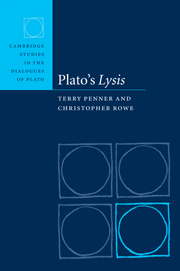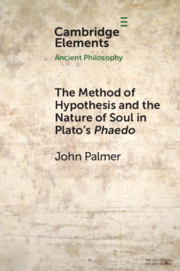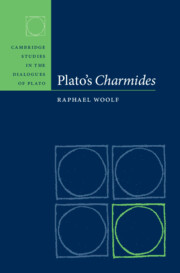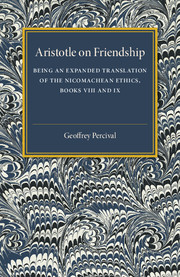Plato's Lysis
The Lysis is one of Plato's most engaging but also puzzling dialogues; it has often been regarded, in the modern period, as a philosophical failure. The full philosophical and literary exploration of the dialogue illustrates how it in fact provides a systematic and coherent, if incomplete, account of a special theory about, and special explanation of, human desire and action. Furthermore, it shows how that theory and explanation are fundamental to a whole range of other Platonic dialogues and indeed to the understanding of the corpus as a whole. Part One offers an analysis of, or running commentary on, the dialogue. In Part Two Professors Penner and Rowe examine the philosophical and methodological implications of the argument uncovered by the analysis. The whole is rounded off by an epilogue of the relation between the Lysis and some other Platonic (and Aristotelian) texts.
Product details
No date availablePaperback
9780521103190
384 pages
229 × 152 × 22 mm
0.56kg
Table of Contents
- Preface
- Part I. An Analysis of the Lysis:
- 1. 203AI–207B7: the cast assembles and the main conversation is set up
- 2. 207B8–210D8 (Socrates and Lysis): do Lysis' parents really love him?
- 3. 210EI–213C9: Socrates and Menexenus - how does one get a friend?
- 4. 213DI–216B9: Socrates and Lysis again, then Menexenus - poets and cosmologists on what is friend of what (like of like: or opposite of opposite?)
- 5. 216CI–221D6: what it is that loves, what it really loves and why
- 6. 221D6–222B2: the main argument reaches its conclusion
- 7. 222B3–E7: some further questions from Socrates about the argument, leading to (apparent) impasse
- 8. 223AI–B8: the dialogue ends - people will say that Socrates and the boys think they are friends, but they haven't been able to discover what 'the friend' is
- 9. 203AI–207B7 revisited
- Part II. The Theory of the Lysis:
- 10. A rereading of the Lysis: some preliminaries
- 11. A rereading of the Lysis
- 12. On seeking the good of others independently of one's own good
- and other unfinished business
- Epilogue
- Translation of the Lysis
- Bibliography
- Indexes.






